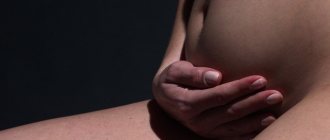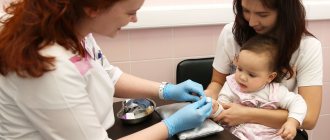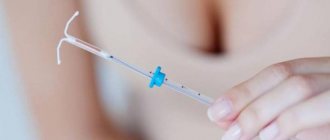Myth or truth: is pregnancy a cure for the body?
Mothers, mothers-in-law and all sorts of neighbor aunties like to tell novice mothers: they say, “I was wearing them at your age, I didn’t notice, I gave birth, spat them out, and then immediately ran to work,” and, perhaps, they will add “even without your diapers.”
And everything was so easy for them, and they themselves flew out of the maternity hospital healthy, strong and beautiful. At least in my memories. Other advisers will just wave their hands: “Pregnancy is not a disease.” “Why is this wrong with me?” – young mothers lament. Why is it so hard during pregnancy, during childbirth, and after that it didn’t get any easier? My health is falling apart, my psyche is weak, and the pressure is so great. There is an opinion that a woman’s body becomes younger after childbirth. And there is scientific evidence for this. Thus, the University of Richmond has proven that hormones produced during pregnancy have a positive effect on many organs, for example, the brain, improving memory, learning ability, even performance. But most women will say that after childbirth they feel constant fatigue, and in the first years, previously unseen sores arise. So where is rejuvenation when there is vitamin deficiency, anemia, inflammation, sleep disorders, nervous disorders, mastitis, lactostasis, decreased libido, hemorrhoids and other “charms”? In general, women differ in their “testimonies.”
Anna S., 32 years old, child 6 months old:
“My hair began to fall out, but my nails, on the contrary, became stronger and my face became clearer.”
Oksana P., 27 years old, child 5 months old
: “I don’t know about rejuvenation, but my kidney is back in place. There has never been a relapse, and even after the birth they said on an ultrasound that the kidneys were symmetrical.”
Feda A., 40 years old, children 11 and 4 years old:
“All external signs - both improvement and deterioration - have nothing to do with the word “rejuvenation”, all this is the influence of hormones. The answer to the question of whether childbirth rejuvenates the body is clear! Pregnancy wears out the body.”
Oksana A., 20 years old, child 2 years old:
“Yes, everyone is different, I didn’t notice any rejuvenation, for example. But my mother gave birth to a child at 36 years old and began to look better. Maybe this applies to those who are older.”
Anna N., 28 years old, child 1 year old:
“I gave birth to one baby and I feel like a sick old woman. My husband’s daughter-in-law gave birth to three, and she looks great!”
Immunity after childbirth
Unnoticed by a pregnant woman, the body fought internal infections, viruses, bacteria, but after childbirth all of them, beaten down but not broken, are activated. At the same time, the pregnant woman’s immunity was naturally reduced so that the body would not reject the fetus. After childbirth, such half-immunity decreases even more so that part of itself is given away with milk. What is the result? Often and quickly, women contract pyelonephritis, mastitis, choriomnimonitis, and endometritis.
Zhanna Arzavyan, obstetrician-gynecologist, candidate of medical sciences:
“All these diseases, unfortunately, are not uncommon postpartum complications. Causes: blood loss, anemia, surgical interventions. What to do to avoid them and how to deal with these things? Just follow the doctors instructions. Most often, therapy is antibacterial, which also means digestive disorders for mother and child. But on the plus side, it’s usually possible to overcome these phenomena that darken the happiness of birth quite quickly.”
We overcame complications while still in the maternity hospital or immediately after discharge - and what next? Immunity does not improve immediately, especially against the background of lack of sleep and fatigue. So it will take time before the woman recovers. Which? The question is individual.
Muscle tone has weakened
During pregnancy and childbirth, the muscles of the pelvic floor, back, and abdomen experienced stress and stretching. If they were not prepared for this, and the woman did not have special sports form, recovery will take a long time. To improve blood supply to the pelvis and strengthen the “intimate muscles”, just a few weeks after childbirth, “Kegel exercises” (on behalf of a gynecologist from the USA) are recommended, initially aimed at combating incontinence, but which have proven excellent in strengthening the tone of the pelvic muscles in women.
Often you need the help of chiropractors and physiotherapists to restore your back muscles. The altered anatomy of the spine (chest, pelvis, neck, shoulders) during pregnancy was again subjected to stress in the form of a baby in her arms. At a minimum, physical exercise is needed to restore vertebral mobility.
Pregnancy and childbirth - women will understand - are difficult for the psyche in themselves, even without the accompanying problems and everyday hardships. Before, during, and immediately after childbirth, hormones go through the roof, like a teenager’s.
Olga Kolt, family psychologist
: “First of all, I want to make a small disclaimer about postpartum depression. Postpartum depression is a form of depressive disorder, and if you experience symptoms such as anxiety, accompanied by palpitations, headaches, panic; subjective state of sadness and sadness; appetite disorders; insomnia; tearfulness; depressed mood; the idea of self-destruction, then you should turn to specialists - a psychotherapist and a neurologist"
The psychologist notes that drug therapy may be required, but only a doctor prescribes it. A child, especially the first, divides life into before and after. In addition to happiness, the birth of a baby means obvious stress, constant fatigue and even irritation with yourself and the child.
Olga Kolt, family psychologist:
“Very often, young mothers do not want to share these experiences with their husbands, family or friends, fearing that they will think badly of them. They try to endure, to cope with it themselves, until so much accumulates that all these negative emotions begin to go into the body and turn into illnesses or become uncontrollable outbursts of anger, or develop into real neurosis.”
The psychologist recommends learning to pull out the elements of happiness, look at everything from an optimistic point of view and compensate for bad thoughts: “If you don’t know what to do with your child, then look for information - this will increase the level of confidence. If you are scared, look for support, share with your husband, mother, friend, psychologist - this will help reduce anxiety. If you are tired, look for helpers, accept help, do not hesitate to ask for it. Take on the happiness of motherhood gradually, give yourself time to readjust, allow yourself to make mistakes and mistakes at the beginning of your journey. And then this happiness will not seem like a heavy burden.”
When will everything be okay?
When does a woman become “herself”? The body needs 3-4 years before a new shock in the form of pregnancy. Minimum. Childbirth is like a stone thrown into water: the waves scatter throughout the body for a long time, giving gradually fading echoes.
How to quickly recover after childbirth? Eat well, take vitamins, play sports - do light exercise, try to get enough sleep. How to deal with this with a baby in your arms? Imagine yourself as a superstar! The only way.
Common health problems after childbirth:
- digestive problems
A common postpartum problem is constipation. They can be provoked by both poor nutrition and low tone of the pelvic muscles. Eat foods rich in fiber, massage your abdomen with a warm stream of water from the shower, drink more water. In some cases, you can use laxative suppositories, but do not overuse them, otherwise the body will get used to it and refuse to work on its own.
- problems with urination
The problem of urine leakage is delicate, there are no words, but this is not a reason to hide it from the doctor. There may be several reasons: weight gain, heredity, diseases of the urinary tract, dysfunction of the sphincters of the urethra and bladder, dysregulation during the passage of the child through the birth canal. If you notice a leak, immediately consult a gynecologist for tests. This problem is easy to solve at first with special exercises, but if the disease gets worse, only surgical intervention will help.
- haemorrhoids
If you discover hemorrhoidal nodules or feel signs of the disease, go to a proctologist. Self-medication is unacceptable!
- problems with seams
Seams require careful and regular care. The doctor will tell you in detail how and how many times a day to treat the suture site, whether it is possible to wet the area of skin damage, whether it is allowed to engage in physical exercise and active sports, and sex.
- postpartum depression
Melancholy, depression, fear for the child - women have experienced all this at all times and will always experience it. But you can’t look for salvation solely in medications, and there are no such drugs. The caring attitude of others, the willingness to help at any time, the opportunity to discuss your experiences and problems - this is what helps in the first place. Remember that a person is capable of going through any difficulties and can handle any task. Believe in the best and look at the world more positively.
- hair loss
Hormone surges cause increased hair loss in the first months after childbirth. You can contact a trichologist if your hair begins to cause concern, and a specialist will help you cope with the problem.
- increased sweating
Sweating itself is not a problem, but a natural process that regulates the water-salt balance in the body. The first 2-3 weeks after birth, sweating can be extremely profuse, bear with it. But you should be wary if, a month after giving birth, you sweat during sleep and in conditions of optimal temperature in the living room. The cause may be an inflammatory process, disruption of the kidneys, or sweat glands. Another reason is a hormonal disorder: a sharp drop in estrogen levels in the body. Therefore, visit a doctor for your own peace of mind.
REFERENCE! The mistake is to try to reduce the amount of liquid. Lack of water will not get rid of sweating, but will only intensify it and cause a bunch of related problems (insomnia, headaches, increased fatigue, dry skin, etc.)
Your Baby
The son of Svetlana Tarabarova appeared on screen for the first time
“I don’t want and I won’t”: 7 tips on how to survive a child’s three-year crisis
Symptoms of appendicitis in a child: when is delay dangerous?
What gets into breast milk from mom's food?
How to take care of your skin during pregnancy
Vaccination calendar
Pregnancy Calendar
Complementary feeding table
Childbirth rejuvenates a woman: truth or myth?
Probably everyone has heard the mysterious phrase that childbirth rejuvenates the female body. Is it true what they say or is it just a myth? Let's figure it out.
The modern world is very different from past centuries. Now having a child at 35 or later is not a problem with modern advances in medicine. Now remember the story of Romeo and Juliet, teenagers in love who are already dreaming of a family. And Juliet’s mother, who at 28 was already a respectable lady...
Doctors say: the optimal age for the first birth today is after 22 years. Psychologists add: it’s better to wait! It has been proven that by the age of 30, a woman already has time to live her life and make a conscious decision to give birth to a child. This means that the risks of postpartum depression are lower, and worries with the baby are a joy.
But what about the rejuvenating benefits of childbirth? Is it true that after giving birth a mother will experience a second youth?
Quick recovery after childbirth - myth or reality?
Is it possible to recover after childbirth in the shortest possible time? Yes, but this process requires a lot of effort. Proper nutrition and a set of exercises will help you get in shape
. Breastfeeding increases your chances of losing excess weight even more. Every day you will lose up to 800 calories while breastfeeding your baby. Of course, everything depends on your state of health. There are a number of contraindications after pregnancy that prohibit new mothers from actively engaging in sports and abruptly switching to a different diet.
Childbirth rejuvenates the female body: how?
There are two sides to this. After giving birth, a mother really looks younger, and we have hormones to thank for this. Estrogen, also called the pregnancy hormone, reduces blood pressure, strengthens bones, and tones muscles. After giving birth, moms are less likely to have high cholesterol, stroke, or hearing problems.
Childbirth also rejuvenates a woman’s body in a psychological sense: pregnancy and breastfeeding will help a mother at 40 to feel like a young mother.
Safe cosmetics
Even if you are not breastfeeding, after giving birth you should think about the safety of your decorative and skincare products. Being in constant contact with your baby, kissing and hugging him, you can provoke an allergic reaction by using a cream with aggressive ingredients. Give preference to organic cosmetics and avoid products with the following ingredients:
- Mineral oil;
- Parabens;
- Sodium lauryl sulfate (aka sodium lauryl sulfate);
- Phenoxyethanol;
- Aluminum salts;
- Methylchloroisothiazolinone and methylisothiazolinone.
Remember that there are at least two people for whom you are the most beautiful woman in the world: your baby and your husband. Bloom under their admiring glances and don’t feel complex about minor postpartum problems, of which soon there will be no trace left.
But childbirth is also a big burden on a woman. Why?
Childbirth rejuvenates the body, but this concerns an abstract healthy body. Nowadays, women get pregnant later, and by this time they may have some chronic diseases.
For example, my first pregnancy at 25 years old was almost perfect and unnoticeable, and the second, at 31 years old, was already complicated by problems with the thyroid gland and kidneys. Due to late gestosis (which, as I learned later, occurs 7 times more often after 30 years) and the danger of hypoxia, I had to have an emergency caesarean section. Therefore, be sure to consult a doctor if you have any chronic diseases. You will probably have to see an obstetrician-gynecologist more often.
Remember also that the baby actually takes everything he needs from his mother’s body on a non-repayable loan. That is, goodbye, healthy teeth and hair. Hello, brittle nails and an ever-aching lower back. Of course, usually the mother is ready to do this for the sake of the baby. This is maternal feat and dedication.
Inevitably, a mother experiences a hormonal decline after childbirth. When you understand: I’m a mother after giving birth, and I’m tired... And then only the mother herself can take care of herself.
How can you ensure that childbirth truly rejuvenates you?
If you give birth to a baby and take care of him, you are already a wonderful mother.
For childbirth to rejuvenate you, take care of yourself as much as you do of your baby.
Believe me, it is possible to be a happy mother after childbirth, even when it is very difficult for you. Allow yourself to be vulnerable, sad, whiny, sentimental, weak. Childbirth is truly a special experience!
Look at your new body with love: stretch marks, scars, new kilograms do not spoil you. They helped the baby to be born. And they deserve respect!
Ask for care from your husband and family and accept it. Only then will you become stronger, oddly enough. Because you can give warmth to both the baby and yourself, who was reborn after childbirth strong, brave and generous. A real mother.
Two stages of recovery
The period for a woman to restore her emotional and physical balance after childbirth usually takes 42 days. This period is divided into early recovery: the first two weeks after the birth of the baby, and late period: from the 15th to the 42nd day.
- Earlier recovery
In the first two weeks, the new mother should pamper and delight herself. Her main concerns should ideally not go beyond swaddling, caring for herself and the baby. If you have a husband and loved ones, it is better to temporarily delegate household chores, including cleaning and cooking, to them. In this case, recovery from stress will be most comfortable.
But meeting with friends and celebrating the birth of a new child should be postponed for at least a month. For those around them, such gatherings are a great joy, but for mother and child they are a real test. It is best if the meetings are combined with something useful for the family. For example, a young mother should not refuse help around the house from a friend.
- Late recovery
2 weeks after giving birth, the woman’s body begins to get used to the new status that it had before the birth of a new life. The genitals begin to change, postpartum discharge is reduced to a minimum. At the end of the late period, you can gradually introduce gymnastic exercises into your life to recover after childbirth. Yoga, Pilates, and stretching are best suited. But it’s better to hold off on strength and cardio exercises.
The anti-aging effect of pregnancy: what to expect, and what is it better to insure against?
- Does pregnancy make you look younger? “Come on!”, the skeptical young ladies and child-free girls will grunt. But optimists focused on motherhood will reasonably object to them: even at the very beginning, pregnancy radically changes hormonal levels, which affects the condition of the skin, hair and nails. Which one is right? What pleasant and not so pleasant surprises does pregnancy give us?
- The skin of the face and body acquires that same “natural glow” that books and magazines for expectant mothers talk about (and which advertisements for all kinds of creams promise). So, you may notice that your skin begins to look fresher and brighter - this effect is fully manifested in the second trimester of pregnancy. Those same hormones are partly responsible for this effect, but an increase in blood volume is also important - more blood flows to the skin, the trophism of the dermis improves, which gives it a radiant appearance.
- Fast Growing Nails: Up until the fourth month, your nails may start to grow faster, but. then negative aspects may begin to be noted - calcium is lost, because the child’s skeleton and other organs need to grow, and without this microelement he cannot do anything. For this reason, your nails may become softer or too brittle, and you may notice tiny grooves forming along the base of your nails. They should return to normal life within a few months after giving birth.
- Fabulous hair: in the second trimester of pregnancy, you may notice that your hair looks healthier - your hair has definitely become thicker and heavier. Of course, in fact, the structure of the hair has not changed, the secret is different: thanks to the influence of pregnancy hormones, you simply began to lose less hair.
- Your breast size is getting larger – by at least one digit: now you will have something to show off in a new fashionable and provocative blouse with a deep neckline!
Pregnancy rejuvenates a woman: arguments against
"I am pregnant. Why don't I feel great? The very status of a pregnant woman and the accompanying manifestations can bring a stream of conflicting emotions. Even though you are overjoyed by the new life growing right inside you, there are times when you are upset - and with good reason: even the appearance of a waist disappears, more and more stretch marks appear on the stomach, buttocks and thighs, and... behind the abdomen, both visibility and mobility are gradually lost. And you just watch how you gain weight kilogram after kilogram. But, stop panicking - this is not forever. Rest assured, in the second trimester of pregnancy everything becomes easier for everyone (especially since by this time widespread toxicosis has passed). Many mothers admit that the most difficult time for them was at the very beginning, when it was mentally and psychologically difficult to get used to such drastic “bodily transformations.”
With all the changes going on in your body, it's natural that you sometimes feel regret about that great body you had before pregnancy. It's reasonable to worry about whether you'll be able to get it back - and how soon? But relax and enjoy your exciting situation: there are many pregnancy bonuses that will help you look and feel amazing!
Does pregnancy rejuvenate: arguments for it
So, the level of female hormones, which directly affect the condition of the skin and its appendages, that is, hair and nails, is a significant issue. With this in mind, what pleasant surprises can you expect from pregnancy?
Restoring your figure after childbirth
How to restore your figure after childbirth? A rounded belly, breasts that have lost firmness, weakened muscles and excess weight are known consequences of pregnancy. The first thing you should pay attention to is your diet. Most women and girls, while they are pregnant, do not like to deny themselves their favorite food. When the baby is in the womb, it stimulates her appetite. However, the habit of “eating for two” is worth getting rid of. After pregnancy, it is important to speed up your metabolism. To do this, you need to eat foods high in fiber. Avoid unhealthy foods such as fast food, fatty foods, sweet pastries and carbonated drinks. The next step is the rules in the diet and eating regimen
. Each recommendation will improve your metabolic rate and reduce hunger:
- Try to count calories daily. Breakfast should be the most plentiful part of the diet.
- Legumes, fish, and chicken fillet are considered excellent sources of protein that reduce hunger.
- Whole grains, fruits, vegetables and greens are rich in vitamins and fiber. Use them daily in your menu.
- Give preference to natural dairy products.
- Nuts, raisins and honey
will strengthen the immune system and add energy throughout the day.
The second step is sports. Exercises to regain your figure after childbirth should include cardio training, strength training and stretching.
How to restore your belly after childbirth?
Diastasis recti is a known consequence of childbirth. This problem is eliminated by partially eliminating carbohydrates from the diet, physical exercise and a slimming belt. When using a special corset, make sure that it provides proper support.
Eating a balanced diet
, you can remove excess belly fat:
- Breakfast should be hearty.
- Include as many fiber-rich foods as possible: oats, beans, lentils, fruits and vegetables.
- Portions per day should not exceed five.
- Choose wholemeal rice, bread and pasta.
- Don't get carried away with sweet baked goods (especially store-bought ones). It contains large amounts of fat and sugar.
Restoring the abdomen after childbirth is impossible without playing sports. Exercises will restore elasticity to the abdominal muscles:
- Pelvic tilts stimulate fat burning.
- Pilates or yoga will give you flexibility, strength and tighten your abdominal muscles.
- Cardio workouts such as swimming, running, cycling, aerobics will keep your heart rate normal.
How to restore breasts after childbirth?
Breast shape often changes after pregnancy. Doctors recommend that nursing mothers perform a special set of exercises that will help restore the firmness and firmness of the breasts. Feeding your baby should not be a hindrance. By doing simple exercises, your child will continue to receive nutrients. However, exercise should not be too intense, as it stimulates the accumulation of lactic acid in the milk. This gives your baby a sour taste, which can dramatically reduce his appetite. It is recommended to exercise moderately and immediately after feeding.
Give birth, give birth and give birth again!
It is gratifying that some couples dream not of one or even two babies, but of three or four little ones or more. However, with all their desire, not all spouses can afford to have several children. What is the reason? Do pregnancy and childbirth really “rejuvenate” the mother’s body? What is the difference between carrying your first child and, say, your third child? We asked these and many other questions to Larisa Mikhailovna KOMISAROVA, Doctor of Medical Sciences, Professor, Leading Researcher of the Department of Childbirth Management in High-Risk Women of the Scientific Center of Obstetrics and Gynecology of the Russian Academy of Medical Sciences
It is believed that not every woman is able to conceive and bear several children. Is it so?
- If a woman is healthy, she does not have any extragenital (therapeutic diseases - heart, liver, kidneys, etc.) or gynecological diseases, then she can bear two, three, or five children during her reproductive period. Childbearing function is maintained, as a rule, from 15 to 49 years.
However, some women get pregnant easily, while others require “effort.”
— You see, the ability to conceive depends not only on a woman’s health. It also has to do with the husband’s health, the external environment, immunological aspects, and the regularity of sexual activity. So, if a woman does not become pregnant within a year of marriage, this does not mean that she is infertile or unhealthy. This only means that the couple needs to be examined. First of all, my wife. If she does not have any diseases that lead to infertility, then we need to “work” with the woman and prescribe treatment based on the research results.
It turns out that the ability to give birth to several children speaks about the health of the family. What changes occur in a woman’s body after childbirth?
— The postpartum period is the period of time during which a woman completes the reverse development (involution) of those organs and systems that have undergone changes in connection with pregnancy and childbirth. Depending on many circumstances, including the individual characteristics of the mother, the postpartum period lasts from 6 to 8 weeks. During this period, the body almost completely returns to the state it was in before pregnancy. The exception is the mammary glands, the development of which reaches its peak in the postpartum period, as the functions necessary for feeding the newborn are enhanced.
There is an opinion that the mother’s body renews itself after childbirth, prolonging youth. There is also an opposite point of view: with each pregnancy and childbirth, a woman’s body wears out and ages. How true is this or that statement?
— As far as I know, no scientific research has been conducted to study this issue. But I can say that 3-4 pregnancies will not harm a healthy young woman, and many will even benefit.
If a woman gives birth to children at intervals of two to three years, then during this time her body has time to fully recover, and a new pregnancy will not affect her health in any way. But when a mother has just given birth to a baby, is still nursing him and becomes pregnant again, this can negatively affect her condition. If a woman has any serious diseases, then pregnancy, in most cases, worsens their course, and itself proceeds with complications.
Many women after a caesarean section dream of giving birth “on their own” next time. Some people argue that they dream of having several kids. They say that in our country you can only give birth to 2-3 children this way. Then they tie the tubes...
— After a caesarean section, the mother must be registered at the dispensary immediately after discharge from the hospital. Its main goal is the early detection of menstrual irregularities, diagnosis and treatment of inflammatory diseases of the genitals. After all, all this can cause the formation of a defective scar on the uterus.
In any case, natural childbirth after cesarean section is a very responsible thing. They should be carried out in large, well-equipped obstetric hospitals (perinatal centers), where highly qualified obstetricians and gynecologists are on duty 24 hours a day and are skilled in performing all emergency operations. During childbirth after a cesarean section, an anesthesiologist and a neonatologist must be present, and there must be full readiness to “set up the operating room” in case of an emergency no later than 15–30 minutes after the onset of labor. I note that the course of labor depends on how ready the mother’s body is for this, and on the nature of the contractile activity of the uterus. Therefore, in women with a scar on it during natural childbirth, it is necessary to constantly do cardiography and “take” a partogram (graphic recording of the progress of labor).
Monitor the contractile activity of the uterus, the baby’s heart, the baby’s progress through the birth canal and the general condition of the mother. When a doctor decides whether a natural birth can or cannot be allowed, he takes into account many factors: the condition of the uterine scar, the position of the child, his weight, and the readiness of the cervix for childbirth. In addition, the doctor looks to see if the woman had severe gestosis, placental previa or placental abruption, and how the postoperative period went. If everything is normal, the doctor takes the written consent of the woman in labor for natural childbirth.
What changes in a woman’s body occur in the first weeks after the birth of a child:
- pelvic organs
The uterus decreases not only in size, but also in weight: if immediately after birth the organ weighs about a kilogram, then after 6-8 weeks it weighs only 50-75 grams. After the placenta is expelled, the uterus gradually returns to its previous spherical shape and contracts. At this time, the woman feels nagging and aching pain in the lower abdomen. It's all about oxytocin - a hormone that is intensely released during lactation and affects the contraction of the muscles of the uterus.
REFERENCE! Sometimes the uterus does not contract. Then, to speed up the process, the doctor prescribes intramuscular oxytocin injections and a special massage to the patient.
- The cervix returns to its previous state much more slowly than the uterus itself, so we can talk about final recovery no earlier than 3-4 months after birth. And it will no longer have its previous shape: instead of conical, it will take on a cylindrical appearance, and the outer pharynx, previously round, will become slit-like. This change only applies to women who gave birth naturally. In patients who have undergone a cesarean section, the form is preserved. But this is not a reason for alarm: the shape does not matter and is only noticeable to the gynecologist during examination.
- The tone of the vaginal muscles is gradually restored, and a couple of months after childbirth its size decreases. Doctors strongly advise to wait with sexual activity and allow all organs of the reproductive system to recover properly. It won't take long - just wait 2-3 weeks. However, in difficult cases (if a rupture of the cervix, perineum or vagina occurred during childbirth, requiring dissection and suturing), the timing is negotiated individually.
- The bladder has been noticeably compressed for a long time, so the decrease in tone will be noticeable in him too. Often women do not feel the urge to urinate for a long time or they have problems with urine leakage. In the first case, you will just have to be patient and wait until the tone is restored (to do this, train yourself to visit the toilet every 2 hours), and secondly, rush to the doctor for a consultation. Changes also occur with vaginal discharge. The first time after delivery, the patient experiences lochia discharge from the genital tract - bloody discharge with an unpleasant odor. In the first days they are abundant, gradually the volume decreases, the color becomes lighter (from brown to transparent), after about 6 weeks the lochia is replaced by normal menstruation.
ATTENTION! These days, pay special attention to the cleanliness of the genitals - the birth canal is still open and infection can easily get into it. Therefore, maintain personal hygiene and change pads more often.
- musculoskeletal system
Intense loads on the musculoskeletal system seem to be a thing of the past: the big belly has disappeared, the center of gravity is gradually changing, and the back muscles are changing the direction of support. However, such processes are often accompanied by aching bones, pain in joints and muscles, and cramps in the limbs.
ATTENTION! If you did not have any abnormalities before pregnancy, then recovery will be faster. But completely healthy people are now rare: many have had flat feet, scoliosis, and the consequences of fractures or dislocations since their school years. Therefore, their musculoskeletal system is not fully restored and takes much longer.
- skin, hair, nails
Almost every woman notices deterioration in the condition of the skin, nails and hair. This is not surprising! After all, the child takes a good half of the nutrients from the mother, and the lack of microelements and vitamins necessarily affects the appearance. Hair becomes dull and lifeless, breaks, split ends, and the scalp dries out. The skin also dries out: it takes on an unhealthy tint and becomes covered with acne and pimples. The nails break and peel, and white stripes appear on the plate due to a lack of calcium.
In order to avoid all these unpleasant phenomena, you should adjust your diet in advance, do gymnastics, take vitamin complexes, and use age-appropriate cosmetics and natural products.
IMPORTANT! Every pregnant woman is afraid of stretch marks on her stomach and hips. They indicate that the skin is not elastic enough. Unfortunately, stretch marks cannot be completely removed. But to prevent such a nuisance, a lot of means have been invented: these are special creams for faster regeneration, and natural substances. For example, olive and coconut oils, which perfectly preserve the skin's original appearance. Don't neglect contrast showers and exercises for your abs and thighs.
REFERENCE! A dark line on the tummy appears in the last months of pregnancy, but does not persist for life, so there is no reason to panic. Be patient a little: in six months or a year it will completely disappear.
- the cardiovascular system
Prolonged bleeding from the genital tract reduces the amount of blood in the female body, so be prepared for some unpleasant sensations: a decrease or increase in blood pressure, an acceleration of the heart rate. This is not dangerous, but it causes discomfort, so describe your sensations to your doctor, and he will select supportive measures. Remember that proper rest and a balanced diet often cope with problems better than any medications, so try to allocate more time for sleep, do not overload yourself with household chores and do not skip meals.
ATTENTION! Since the platelet count increases sharply these days, the likelihood of thrombosis increases.
Is it true that after childbirth the body rejuvenates?
Personally, my appearance has worsened. I haven’t gained weight, haven’t lost weight... but on my face... I’ve aged...
- Thank you 2
- Thank you 2
- Thank you 2
- Thank you 1
Of course not, pregnancy and childbirth are a lot of stress for the body, even if you don’t take into account weight, stretch marks, etc. I didn’t have a cold for 6 years before pregnancy, and then 6 times in the first year











